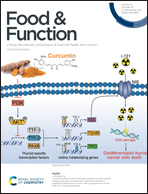Zinc delivery system constructed from food-borne nanoparticles derived from Undaria pinnatifida†
Abstract
Food-borne nanoparticles from Undaria pinnatifida (UPFNs) were prepared and successfully applied as nanocarriers for microelement zinc delivery. UPFNs were spherical nanoparticles with average sizes of about 4.07 ± 1.09 nm, which chelated with zinc ions through amino nitrogen and carboxyl oxygen atoms as characterized by X-ray photoelectron spectroscopy, Fourier transform infrared spectroscopy, and 1H nuclear magnetic resonance spectroscopy. Thermodynamic analysis revealed that the overall chelation process between UPFNs and zinc ions was a spontaneous enthalpy-driven endothermic reaction. Compared to zinc sulfate, UPFN–Zn2+ showed higher solubility both in phytic acid solution and the process of gastrointestinal digestion. Meanwhile, no obvious cytotoxicity was found in UPFNs and UPFN–Zn2+. Specifically, UPFN–Zn2+ could successfully rescue cell viability, DNA replication activity and restore cell proliferation ability in zinc-deficient cells induced by a specific zinc chelator TPEN. Overall, UPFNs might serve as efficient, stable, and safe nanocarriers for zinc delivery.



 Please wait while we load your content...
Please wait while we load your content...